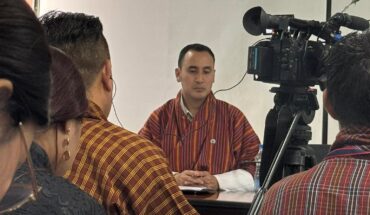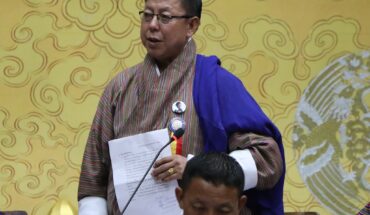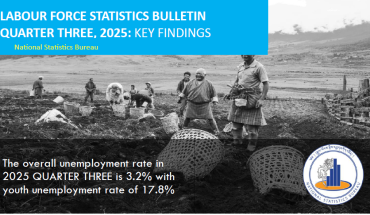
A Trashnology pioneer’s simple call for a cleaner future is met with a momentous national honor
PEMA TSHOMO
Thimphu
On a momentous day graced by the presence of His Majesty, a corporate employee with a humble vision and an unrelenting commitment to environmental conservation stood at the center of national attention. Awarded the National Order of Merit for his contributions to waste management through his unique approach, Trashnology, this individual’s story is one of humility, determination, and an inspiring call to action.
47-year-old Namgay Wangchuk’s, General Manager (GM) of the Natural Resources Development Corporation Limited (NRDCL), journey is emblematic of quiet resilience and purpose. With an academic background comprising a Master’s in Human Resource Management from Edith Cowan University, Perth, and a Bachelor’s in Commerce (Hons) from Sherubtse College, he transitioned from roles in the civil service and the Bank of Bhutan to joining NRDCL in 2023.
Yet, it wasn’t his professional portfolio that earned him national recognition—it was his grassroots commitment to addressing one of Bhutan’s pressing environmental challenges: waste management.
“Receiving the award from His Majesty was initially overwhelming,” he shared, reflecting on the occasion. “It was a nervous moment, which took quite a while to subside. But then, I realized the enormity of the honor. His Majesty’s recognition of a simple act of Trashnology is deeply humbling. It was never about name, fame, or awards. This makes the recognition even more special.”
The concept of Trashnology, as he explains, is not a grand innovation but a call to action rooted in the simple principles of responsibility and respect for one’s surroundings. “To me, Trashnology is dharma,” he said, emphasizing its spiritual dimension. “Cleaning places is like cleaning the abodes of Kenchog Sum, Buddhas, and Bodhisattvas. It is like making and maintaining an auspicious container where precious treasures can accumulate. It is an act of service, love, and loyalty to the King, country, and people.”
He candidly admits that he has no grand plans following the honor. “I have no plans. All I want to do is what I can do, continue sensitizing our people on waste management through my Trashnology actions,” he explained. His mission is to inspire individuals to rethink their relationship with their environment and embrace the idea that the whole planet is our home, not just the four walls we live in.
His optimism about human potential is unwavering. “I am optimistic that people are actually better than how they act, and one day, not far from now, we will become the best in this aspect of life,” he expressed. He sees the award as a “Royal indication that each one of us must manage our wastes responsibly.”
Beyond personal recognition, he warns of the dire consequences of failing to address waste management, particularly the growing menace of plastic and glass waste. “If we do not take care of our wastes responsibly, it’s a scary future. These wastes damage the aesthetics of our places while everyone is looking for beautiful scenes to view and clean, green grounds to rest on,” he pointed out.
But aesthetics is just the tip of the iceberg. He stressed that “when everywhere is festered with litter, there will be no lives—no trees, plants, flowers, fruits, or animals. There will be no fertile land to grow food as these litters lead to the loss of soil integrity and fertility.”
His approach to waste management is deeply philosophical, tying the present to the future in an unbroken cycle of interdependence. “We must realize that since we are going to die and come back in different forms of life, future generations mean ourselves. We just don’t know in what form, but any form will need food, water, clean air, and a green earth,” he noted.
What sets his advocacy apart is its grounding in the sacred duty to preserve Bhutan’s pristine environment as a tribute to its leadership and culture. He described Bhutan as “our Bodhisattva Monarch’s palace, the sanctity of which must be maintained.” This perspective transforms waste management from a mundane chore into a spiritual and patriotic duty.
Despite his achievements, he remains grounded and focused on inspiring collective action. “I hope people will realize that this award is a Royal indication that each one of us must manage our wastes responsibly,” he said, reiterating the significance of individual responsibility.
The magnitude of the problem he seeks to address cannot be overstated. Litter, particularly non-biodegradable waste like plastic and glass, is not just an environmental eyesore but a threat to ecosystems and human survival. The gradual degradation of fertile soil, contamination of water sources, and harm to biodiversity are all cascading effects of unchecked waste.
His message resonates far beyond the borders of Bhutan. In an era of climate change and global environmental crises, his grassroots approach is a reminder that sustainable change begins with individual actions. “Trashnology is a simple act, but its implications are profound,” he noted. “It’s about fostering a culture of care and responsibility.”
He envisions a future where Bhutan serves as a model for the world in waste management and environmental conservation. “People need to rethink the meaning of our home,” he said. “The planet is our home. If we treat it with respect, it will sustain us for generations to come.”
The award he received is not merely a recognition of past efforts but a beacon of hope for the future. It signifies the power of simple yet profound actions to inspire change at both individual and societal levels. His humility, determination, and vision serve as a clarion call for all to rise to the challenge of protecting our environment.
In his own words, “Cleaning places is not just about removing litter; it’s about preserving life. It’s an act of love for the world we live in, a commitment to the future, and a tribute to the values we hold dear.”
Individuals like him remind us that the path to a cleaner, greener future lies in our hands. His story is not just a tale of recognition but a rallying cry for collective action, proving that even the simplest acts can have monumental impacts when driven by purpose and a sense of duty.





